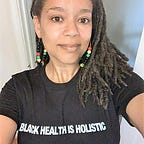Reducing white dominance from academia
Edited reposting from May 2019
At the beginning of 2020, shortly before COVID-19, I left full-time academia and increased my focus on community advocacy and teaching and learning beyond campuses and classrooms.
Below is an edited reposting of my May 2019 Medium piece:
A white academician made a negative comment in an academia social media post that researchers cannot research a topic for which a researcher personally identifies and personally experiences.
Here’s my socially conscious, inclusive, and not white response: That academician’s statement is not only false and outdated but also based on Eurocentric and white-centric definitions of research.
False objectivity, false neutrality and as though being an outsider is the crucial format for research.
No, those of us who work directly with people whose identities and experiences are marginalized and silenced, are often marginalized and silenced ourselves.
For example, Black criminologists and Black sociologists such as myself are often invested in increasing the voice for topics that have direct and indirect impacts on our identities and experiences. We encompass various demographics and cultures including but not limited to race and ethnicity, gender identity, sexuality, and socioeconomics.
This does not make us ignorant of research design and methodology. We are not more likely to attach our assumptions and biases to our research than other researchers who falsely considered themselves neutral and objective outsiders to the research sample.
Lastly, to illustrate the outdatedness and narrowness, based on the false logic of “don’t research people for which you personally identify,” is it methodologically flawed for academicians to research student development and student success?
We were students before completing academic degrees!
I specialize in a range of issues including racial identities and racism shaping, and shaped by, schools, law and law enforcement, medical and health conditions and services, and economics and employment.
Must I remove myself from these teachings and research because I am Black and descendant of centuries of Black enslavement on this stolen land that became USA?
Must I remove myself from these teachings and research because Black people are less likely to have adequate schools, adequate health services and preventive measures, adequate employers, and Black people are disproportionately likely to be harmed by law enforcement entities?
Should these teachings and research only be done by non-Black people and especially white people since white people are majority of staff decision makers and teachers for K-12 schools and colleges and universities?
Do we need five more centuries of white people controlling our fields of expertise and occupations, our personal lives, and white people pretending whiteness is a blank slate lacking demographics, cultures, beliefs, assumptions, sociopolitical affiliations, and experiences?
Academicians, and people, in general, must end the falsehood that complete objectivity and complete neutrality are possible.
Academicians, theorists, and researchers are subjective and shaped by our personal views from the moment we think of concepts, theories, and research topics that interest us and we choose which news-media-website outlets and peer-reviewed journals to publish our writings and research.
The key is furthering qualitative research and quantitative research methodologies, furthering community outreach and public policy, and comprehending factual information and information that changes throughout time and across contexts.
This should be an introductory lesson in every academic program, every theory course, every statistics course, and every methods course.
Social scientists teaching positivism as countering classical school need to reduce the European-white approach (and men approach) that pretends positivism is full objectivity, full neutrality, and unchallenged facts.
It is important to explain balancing demographic and cultural identities, consciousness, and subjectivity with research methods and data reliability and validity.
Please find podcasts and services on 365 Diversity.
